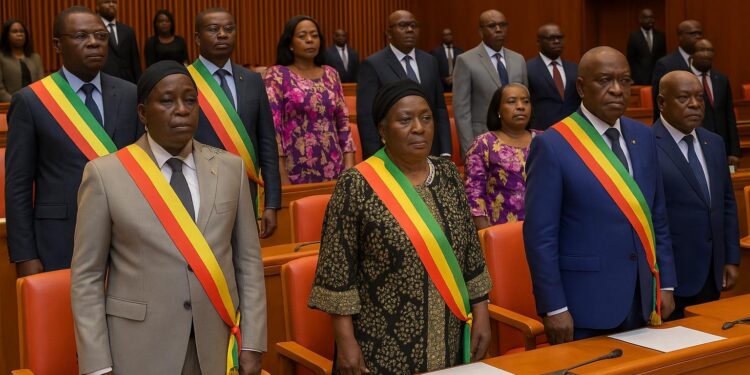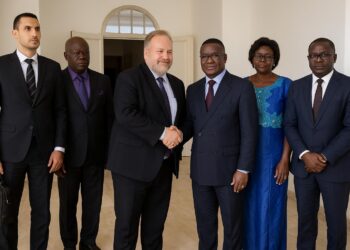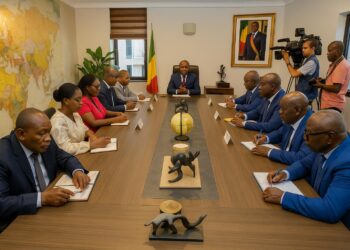Budget Session Signals Fiscal Discipline
Meeting in Brazzaville on 15 October, the Senate opened its seventh ordinary budget session with one objective: craft a lean, operational finance law that keeps the 2022-2026 National Development Plan on track and equips government with credible tools amid a still delicate regional economic environment for public spending.
Senate President Pierre Ngolo described the exercise as ‘a cardinal moment of democratic life’ and urged members to make allocations reflect urgent priorities while remaining consistent with the plan’s pillars of diversification, social progress and environmental stewardship, calling for concrete acts rather than broad aspirations during this session.
He reminded colleagues that society is ‘asking many questions’ and expects representatives to show diligence and rigour, especially as external partners examine Congo-Brazzaville’s capacity to deliver promised reforms; failure to act responsibly, he warned, would erode public trust at a sensitive political juncture marked by upcoming national polls.
Key Bills on the Agenda
The agenda features three core texts: the draft finance law for 2026, a rectifying budget for 2025 and the settlement bill covering 2024 accounts, instruments that together give legislators an integrated view of planning, adjustment and ex-post control over state resources before, during and after expenditure cycles.
A fourth bill proposes amendments to the 2001 electoral law, signalling intent to refine procedures ahead of the March 2026 presidential election, a milestone that Pierre Ngolo called the ‘largest test’ of patriotism and political maturity expected of the nation in coming months for peace and democracy consolidation.
Responsibility Beyond Adoption
During debate, the chamber president stressed that responsibility extends beyond passing texts; senators must monitor implementation and ensure discipline becomes ‘the rule applicable to all,’ so that measurable improvements in public services and project delivery can emerge from the budgets they endorse through field visits and reports regularly.
Ngolo argued that diligent follow-up is crucial if the country wants to maintain momentum on the National Development Plan, whose projects—ranging from infrastructure renewal to human-capital programmes—depend on predictable cash flows and transparent procurement, areas often scrutinised by civil society and development partners alike during periodic audit sessions.
Several members referenced the public’s expectation for visible outcomes, noting that improved roads or school rehabilitations serve as tangible evidence that budget lines are more than ledger entries; conversely, delays quickly feed scepticism, a dynamic underscoring why oversight is inseparable from appropriation in any representative fiscal system today.
Voter List Revision and Civic Duty
Attention also turns to the extraordinary revision of electoral lists, closing on 30 October, an administrative step deemed essential for inclusive participation; the Senate leader urged citizens to seize the opportunity so that, when ballots open, no voter is disenfranchised for bureaucratic reasons, a core democratic safeguard nationwide.
He cautioned, however, that the tone on social networks risks clouding preparations, noting that mobilisation of opinion ‘cannot be forced by insult, slander or intimidation’ but rather earned through credible and defensible programmes, a message echoed later by the government’s communication services in briefings to media and parties.
Observers inside the chamber underline that a peaceful presidential contest would reinforce Congo-Brazzaville’s image as a reliable destination for diaspora remittances and investment, factors viewed as central to financing ongoing reforms without accumulating unsustainable debt, especially in a post-pandemic global financial context marked by cautious lending and volatility.
Institutional Predictability Ahead of 2026
In that light, the current budget session acquires significance beyond domestic bookkeeping; it becomes a signal to regional peers and creditors that democratic institutions are functioning and that policy remains anchored in consensus, despite the heightened political temperatures typical of an electoral countdown across ministries and parliamentary benches.
Pierre Ngolo concluded the opening sitting by stating that the Senate’s deliberations must ‘give priority to Congo,’ an exhortation interpreted by analysts as a call for unity of purpose rather than uniformity of opinion, a nuance observers believe could ease negotiations across party lines during the budgetary marathon.
By 23 December, when the gavel falls on the session, senators aim to deliver an actionable finance law, revised forecasts, and an updated electoral framework—documents expected to guide both public administrators and private actors through 2026, reinforcing the institutional predictability prized by investors and development finance partners alike.
From Budget to Ballot-Box Credibility
Stakeholders will monitor whether the ensuing months see budget provisions translated into tenders and project launches on the ground; if so, the dual objective of supporting economic recovery and safeguarding an atmosphere of calm ahead of national elections could reinforce each other in practice across sectors and provinces.
Should that scenario unfold, the seventh ordinary session might be remembered less for its procedural workload than for having bridged fiscal scrutiny and democratic preparation, illustrating how budgeting and ballot-box credibility complement rather than compete in the Republic of Congo’s ongoing development narrative at home and abroad alike.











































